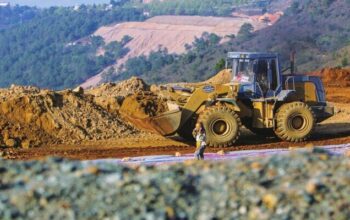Angola plans to produce one million and one hundred thousand barrels of oil per day by the end of this year, declared the Director of Production of the National Agency for Oil, Gas, and Biofuels (ANPG) in Luanda.
Ana Miala, who participated in the panel on Exploration and Production Opportunities in the Southern African Frontier as part of the sessions and discussions program of the 4th Annual Conference and Exhibition of the Oil and Gas Sector 2023, which took place under the theme “Energy Security, Decarbonization, and Sustainability,” stated that “the low operational capacity observed in the first quarter of this year did not allow the country to meet the expectations of increasing production levels.”
According to Ana Miala, “in the coming years,” Angola will continue to maintain the target of 1,100 thousand barrels of oil per day. She said, “If we can achieve satisfactory results in the exploration activity, we may consider increasing production levels above 1,100 thousand barrels of oil per day.”
Regarding the low production experienced daily, Ana Miala mentioned that it did not affect the decline in oil exploration in Angola, despite the country not reaching the desired levels.
She stated, “Our decline is 15 percent. But in a satisfactory production year, we may not feel that decline,” adding that “last year, we produced more than in 2021 without feeling the decline. We brought into our system production above the normal decline.”
According to the ANPG production manager, to improve oil production capabilities, preventive maintenance and rehabilitation of fields installed many years ago in the country are necessary.
Investment Projects:
With the aim of increasing current production levels, ANPG is working with various partners to find better ways of recovering oil fields. She said, “We want operators to feel encouraged to rehabilitate these fields because we recognize that they were designed for 15 to 20 years. With 60 years of production, they require rehabilitation work. The state is willing to allow this investment to be made according to practices used in other countries,” Ana Miala stated.
Dália Field has already produced over one billion barrels:
Dália Field, considered the most productive in the sector, capable of producing over one billion barrels of oil, has a reserve of over 200 million barrels, according to the Director of Production at ANPG. She noted that the field mentioned above has additional potential resources that can be converted into production reserves valued at more than 500 million barrels.
“The sharing of production in Dália Field favors the state with 80 percent, and 20 percent goes to the operator. In this 20 percent, the contractor deducts 10 percent to pay taxes, with no significant profits for the oil company. We believe this scenario does not encourage the operator to continue investing,” she said.
To reverse this situation, the Director of Production of the National Agency for Oil, Gas, and Biofuels emphasized that the state is developing a project to encourage operators to continue investing in the country. She said, “We want the operator to feel motivated to continue operating in Angola. Instead of 80/20 percent, we could move to 60/40 or 70/30 percent in favor of the contracting group for additional production, not for basic production and state reserves.”
ExxonMobil initiates drilling in the Namibe Basin:
The General Director of ExxonMobil in Angola, Melissa Bond, assured that the American oil company will start drilling for oil in the Namibe Basin next year during the panel on “Exploration and Production Opportunities in the Southern Africa Frontier.” However, she did not provide specific quantities of oil to be produced in the first year of operation. She explained, “In a first phase, we will work to understand what exists in the Namibe Basin because we are talking about a frontier basin that has never been explored. We don’t know what is there.”
Minister invites investors to seize opportunities in the country:
The Minister of Mineral Resources, Petroleum, and Gas (MIREMPET), Diamantino Azevedo, encouraged operators to invest more in the oil sector in Luanda. He highlighted the importance of the number of drilling rigs as an indicator for assessing exploration work and called for more investment in the oil sector.
Azevedo stated, “We want to see more rigs drilling the Angolan soil next year; it is a challenge for everyone to take advantage of all the opportunities that the Angolan legislation offers. With the changes we made in the last mandate, the introduction of technical and financial incentives has opened up more opportunities for investment in this sector.”
The Minister advised potential investors to regularly approach the National Agency for Oil and Gas to learn more about the existing opportunities. He also mentioned the ongoing bidding process, with submissions expected in September this year, involving 12 blocks in two onshore basins in the country.
In the context of the 63rd anniversary of OPEC, Diamantino Azevedo emphasized Angola’s important role in the organization since its membership in January 2007 and the country’s commitment to the strategic interests of Angola in the oil sector.
Production:
Relevant Role of Angola in OPEC:
The Secretary-General of the Organization of the Petroleum Exporting Countries (OPEC), Haitham Al-Ghais, highlighted Angola’s role as a member of the organization during the celebration of OPEC’s 63rd anniversary in Luanda. He acknowledged Angola’s significance as a major African oil and gas producer, with significant reserves and potential for development in the petroleum sector.
He stated, “With the strategies I have heard over the past two or three days from the Ministry and the National Agency for Oil and Gas, Angola has the opportunity to increase gas and oil production, which can benefit the country’s economy.”
Al-Ghais emphasized the importance of helping increase the development of member countries and the global economy, maintaining global oil market stability, and advocating for more investment in the sector to meet future demand and reduce emissions.
Operational Strategies:
Operators Discuss Net Decarbonization Goals:
During the first day of the Angola Oil & Gas (AOG) 2023 Conference and Exhibition, a panel discussion presented valuable insights from leading oil and gas companies operating in Angola. They discussed decarbonization strategies in the context of net-zero goals and global trends in the upstream sector. Under the theme “Opening New Paths: Decarbonizing Oil and Gas in Angola,” panelists also explored new investment opportunities to offset production declines while ensuring a sustainable future for Angola’s oil and gas resources.
Moderated by Manuel Mota, Partner and Leader of Climate Change and Sustainability Services at EY, the panel featured Adriano Mongini, CEO of Azule Energy; Edson dos Santos, CEO of Etu Energias; Billy Lacobie, General Manager of Strategic Business Unit for Southern Africa at Chevron; Ricardo Van Deste, CEO of Sonangol E&P; and Mutombo Dondo, Deputy General Manager and Director of Assets at TotalEnergies E&P Angola.
The oil and gas sector in Africa faces the dual challenge of meeting growing energy demand while reducing emissions. The CEO of Azule Energy, as the largest independent producer of oil and gas in Angola, highlighted the company’s commitment to decarbonize its operations and optimize production.
“In terms of decarbonization, the two biggest assets in the production asset are reducing flaring and reducing emissions,” said Mongini, adding, “In the new implementation, we are seeing a new floating production, storage, and offloading (FPSO) unit arriving in 2026. In this new FPSO, we have implemented all new technologies to decarbonize and maximize efficiency.”
The private oil company Etu Energias outlined its strategy for reducing carbon emissions while maintaining operational efficiency. They emphasized their focus on reducing flaring, leak detection, tree planting to remove carbon from the atmosphere, and using carbon dioxide to enhance oil recovery.
Exploring the role of the National Oil Company (NOC) of the country, Sonangol, in advancing Angola’s energy market expansion agenda within a fair and inclusive energy transition, Van Deste described the NOC’s decarbonization strategy and how technology will play a stronger role in the country’s sustainability goals.
![]()




